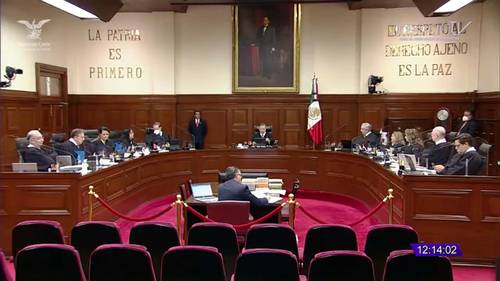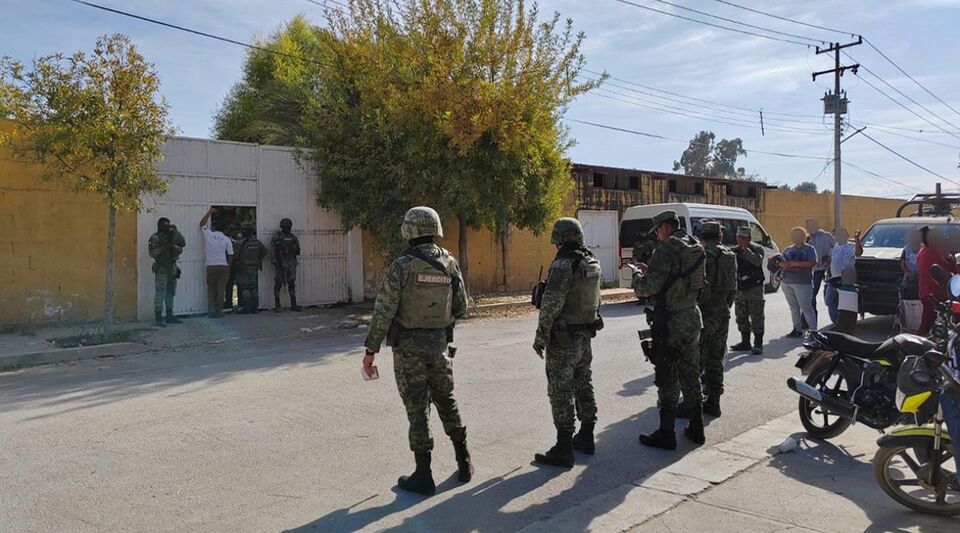Defend the autonomy of the PJF, a common point of candidates to preside over the Court
▲ The highest court published the candidates’ plans on a microsite. Picture from yesterday’s session.Photo SCJN
Eduardo Murillo and Gustavo Castillo
Newspaper La Jornada
Wednesday, December 7, 2022, p. eleven
Collegiate governance, defense of the autonomy of the Federal Judiciary (PJF) and the fight against corruption are the points in common in the work proposals presented by the five ministers who aspire to occupy the presidency of the Supreme Court of Justice of the Nation (SCJN).
In alphabetical order, Yasmín Esquivel Mossa, Alfredo Gutiérrez Ortiz Mena, Javier Laynez Potisek, Alberto Pérez Dayán and Norma Lucía Piña Hernández were the only ones who presented their projects, published by the highest court on its website.
Transparency: Esquivel
Esquivel proposes to consolidate the SCJN as a transparent space, both jurisdictionally and administratively, with direct communication channels with citizens
.
In his project, he indicates that he will promote a Court that acts in a plural and independent decision-making
and that its members participate in a collegiate manner in internal government decisions, through the formation of support committees and commissions
including one made up of retired ministers.
Gutiérrez: virtual courts
For his part, Minister Gutiérrez invites his peers to make collegiate decisions in his proposal: This work plan reserves you an active participation in different decisions that will be taken during my administration
.
Its approach is focused on two axes: strengthening jurisdictional work and improving the administrative actions of the PJF.
In terms of innovation, Gutiérrez exposes the need to create virtual courts that only deal with trials over the Internet, as well as courts for ecological issues.
It concludes with the guarantee of continuing the project of the outgoing president, Arturo Zaldívar: My intention is to make the most of the achievements of previous administrations and adjust what is necessary in administrative and jurisdictional matters. there is nothing new under the sun
.
Political Neutrality: Laynez
For Minister Laynez Potisek it is It is clear that the judiciary must enjoy independence and become aware of what it means to exercise it
as it is only sustainable if political neutrality becomes the absolute guide for its action. The perception of judges in favor of or against a certain political position must be banished
.
Your project mentions as lines of work the strengthening of jurisdictional work, through a diagnosis for a reliable, impartial and effective delivery of justice
as well as the development of a efficient administrative spending and collegiate work within the Court
.
Likewise, it refers that it will promote transparency and the fight against corruption, with the creation of a citizen observatory.
His commitment, he mentions, is at all times defend judicial independence through political neutrality, to from there generate a respectful, purposeful and constructive dialogue with the Legislative and Executive powers
.
Pérez Dayán: credibility
Minister Pérez Dayán exposes the need for all members of the plenary to participate in the leadership of the SCJN: The collegiate exercise in the decision-making of the presidency, so that it is inclusive and respectful of the ideas of the other ministers and ministers
.
Pérez Dayán, who as a magistrate voted in 2002 against the impeachment of Andrés Manuel López Obrador, points out that among the axes of his work plan are the credibility and strengthening of the PJF, autonomy and judicial independence.
He stresses that the basis of his project will be unity and respect among the 11 ministers of the plenary session of the SCJN.
Consolidate Majorities: Pineapple
Minister Piña Hernández, who has publicly expressed her differences with the Zaldívar administration, offers in her proposal that the SCJN once again assume itself as a collegiate body:
Indeed, it will be the ministers, the councilors, who will vote and define the course of our institution. Thus, my central proposal is to work for the consolidation of majorities, yielding to the imposition of my personal vision.
.
He proposes creating a new code of ethics for the PJF, which updates the one in force since 2004. He considers that, with a social context that has changed, a new regulation is necessary, which also includes legal modifications to combat corruption and the General Law of Administrative Responsibilities.
If I become president, with the invaluable support of my colleagues, we will strengthen our presence in defense of judicial independence, the dignity and respectability of judges. Today it is said that they are not listened to, that they are not supported from the leadership of the PJF. I propose to change this scenario, because although judging persons are subject to greater demands every day, it is also essential for them to be supported by their institution.
concludes Minister Piña.








